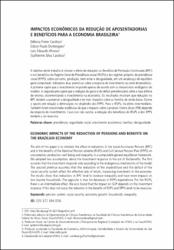Please use this identifier to cite or link to this item:
https://repositorio.ipea.gov.br/handle/11058/13452Full metadata record
| DC Field | Value | Language |
|---|---|---|
| dc.contributor.author | Cardoso, Débora Freire | - |
| dc.contributor.author | Domingues, Edson Paulo | - |
| dc.contributor.author | Afonso, Luís Eduardo | - |
| dc.contributor.author | Cardoso, Guilherme Silva | - |
| dc.coverage.spatial | Brasil | pt_BR |
| dc.date.accessioned | 2024-03-27T18:41:23Z | - |
| dc.date.available | 2024-03-27T18:41:23Z | - |
| dc.date.issued | 2023-04 | - |
| dc.identifier.citation | CARDOSO, Débora Freire; DOMINGUES, Edson Paulo; AFONSO, Luís Eduardo; CARDOSO, Guilherme Silva. Impactos econômicos da redução de aposentadorias e benefícios para a economia brasileira. Pesquisa e Planejamento Econômico, Brasília, v. 53, n. 01, p. 9-35, abr. 2023. DOI: http://dx.doi.org/10.38116/ppp56art1 | pt_BR |
| dc.identifier.uri | https://repositorio.ipea.gov.br/handle/11058/13452 | - |
| dc.description.abstract | O objetivo deste trabalho é simular o efeito de reduções no Benefício de Prestação Continuada (BPC) e nos benefícios do Regime Geral de Previdência Social (RGPS) e dos regimes próprios de previdência social (RPPS) sobre consumo, produção, bem-estar e desigualdade, em um arcabouço de equilíbrio geral computável. Adotamos duas premissas sobre a resposta do investimento ao corte de benefícios. A primeira supõe que o investimento responda apenas de acordo com os mecanismos endógenos do modelo. A segunda pressupõe que a redução do gasto e do déficit previdenciário afete a taxa efetiva de retorno, incrementando o investimento na economia. Os resultados mostram que reduções no BPC tendem a aumentar a desigualdade e ter mais impactos sobre as famílias de renda baixa. Ocorre o oposto em relação a diminuições no dispêndio dos RPPS. Para o RGPS, há efeito intermediário. Também foram encontradas evidências de que o impacto sobre o produto interno bruto (PIB) depende da resposta do investimento. Caso isso não ocorra, a redução dos benefícios do RGPS e dos RPPS tenderá a ser recessiva. | pt_BR |
| dc.language.iso | pt-BR | pt_BR |
| dc.publisher | Instituto de Pesquisa Econômica Aplicada (Ipea) | pt_BR |
| dc.title | Impactos econômicos da redução de aposentadorias e benefícios para a economia brasileira | pt_BR |
| dc.title.alternative | Economic impacts of the reduction of pensions and benefits on the brazilian economy | pt_BR |
| dc.type | Pesquisa e Planejamento Econômico (PPE) - Artigos | pt_BR |
| dc.rights.holder | Instituto de Pesquisa Econômica Aplicada (Ipea) | pt_BR |
| dc.source.urlsource | http://ppe.ipea.gov.br/ | pt_BR |
| dc.location.country | BR | pt_BR |
| dc.description.physical | p. 9-35 : il. | pt_BR |
| dc.subject.vcipea | IPEA::Política Econômica. Política Social. Planejamento::Seguridade Social::Previdência Social – Geral::Previdência Social | pt_BR |
| dc.rights.license | É permitida a reprodução deste texto e dos dados nele contidos, desde que citada a fonte. Reproduções para fins comerciais são proibidas. | pt_BR |
| dc.subject.keyword | Previdência | pt_BR |
| dc.subject.keyword | Seguridade social | pt_BR |
| dc.subject.keyword | Crescimento econômico | pt_BR |
| dc.subject.keyword | Famílias | pt_BR |
| dc.subject.keyword | Desigualdade | pt_BR |
| dc.relation.references | https://repositorio.ipea.gov.br/handle/11058/13265 | pt_BR |
| ipea.description.objective | Analisar os impactos que alterações nos benefícios previdenciários e assistenciais teriam na economia brasileira. | pt_BR |
| ipea.description.additionalinformation | Artigo publicado em: Pesquisa e Planejamento Econômico (PPE): v. 53, n. 01, abr. 2023. | pt_BR |
| ipea.access.type | Acesso Aberto | pt_BR |
| ipea.rights.type | Licença Comum | pt_BR |
| ipea.englishdescription.abstract | The aim of this paper is to simulate the effect of reductions in the Social Assistance Pension (BPC) and in the benefits of the National Pension Scheme (RGPS) and Civil Service Pension Plan (RPPS) on consumption, production, well-being and inequality, in a computable general equilibrium framework. We adopted two assumptions about the investment response to the cut of the benefits. The first assumes that the investment responds only according to the endogenous mechanisms of the model. The second premise assumes that the reduction of the expenditure and the deficit of the social security system affect the effective rate of return, increasing investment in the economy. The results show that reductions in BPC tend to increase inequality and have more impacts on low-income households. The opposite is true for decreases in RPPS expenditure. For the RGPS, there is an intermediate effect. We also found that the impact on GDP depends on the investment response. If this does not occur, the reduction in the benefits of RGPS and RPPS tends to be recessive. | pt_BR |
| ipea.researchfields | Infraestrutura Econômica, Social e Urbana | pt_BR |
| ipea.classification | Economia. Desenvolvimento Econômico | pt_BR |
| ipea.classification | Previdência. Previdência Social | pt_BR |
| Appears in Collections: | Previdência. Previdência Social: Artigos | |
Files in This Item:
| File | Description | Size | Format | |
|---|---|---|---|---|
| PPE_v53_n1_Artigo1_Impactos_economicos.pdf | 368.72 kB | Adobe PDF |  View/Open |
Items in DSpace are protected by copyright, with all rights reserved, unless otherwise indicated.

